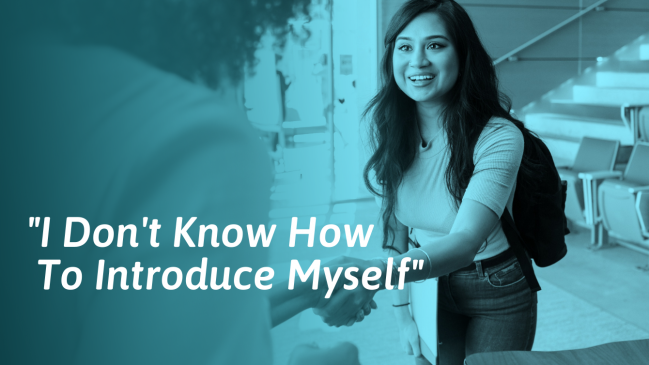Starting college can be exciting, overwhelming—and scary. Meeting and getting to know new people on campus is one of the best ways to feel more comfortable and at ease from the first day. People who make new friends in college report having an easier time adjusting to campus life and are also more likely to still be around in their second year.[1, 2]
Whether you are moving into a dorm, commuting to college, or taking online classes, this article can help you figure out how to introduce yourself to people in college and become part of the social scene on campus.
1. Assume you’re not the only new student
Your first day of classes can feel a lot like being the “new kid” in school who doesn’t know how to get to their homeroom class or who to sit with at lunch. It can be daunting when you don’t know anyone in your new school, but most people you meet on your first day are also new students. This means that most will be just as eager (and nervous) to meet new people as you are, which makes it easier to figure out how to approach people and make friends.
2. Craft an intro speech
Because there’s a good chance that you will get asked to introduce yourself many times in your first days in college—for example, in some of your classes—you may want to craft a brief introduction speech.
Good intros provide basic information about who you are, where you are from, and what your goals are for college, as well as providing an interesting detail or two that people can remember you by.
Here is an example of a good intro to use when first meeting other students or professors:
“Hi, my name is Carrie, and I’m originally from Wisconsin. I’m a military kid, so I’ve lived all over the US and Europe. I’m hoping to major in finance and also to study abroad.”
Practicing some words to say in specific situations can be particularly useful for transfer students. If you are one of them, take a look at this article on how to make friends as a transfer student.
3. Make a positive, intentional impression
People form first impressions of others within seconds of meeting them, with or without their knowledge. Being intentional about the impression you make helps you take advantage of these first opportunities to meet people at college.
Here are some tips on how to start a self-introduction:
- Intention: Your “goal;” what you hope to achieve by introducing yourself.
Example: Set yourself the goal of sharing more about your major (e.g., “I’m majoring in finance and would love to meet others in my department!”).
- Impression: Something you want others to remember about you.
Example: Consider making a memorable impression by sharing something interesting about yourself (e.g., “A fun fact about me is that I’m fluent in Russian”).
- Inside information: “Inside information” is what you want others to know about you.
It should give others important clues to who you are and what you are looking for in your college experience. Example: “I am from Hawaii, so this is my first time on the mainland and it’s really different! I’m still adjusting to the weather.”
4. Initiate 1:1 conversations
It can be overwhelming to introduce yourself to a class or large group of people, and it can also be difficult to form personal connections this way. Try to approach people who seem like they have things in common with you, as friendships are more likely to develop among people who are similar to each other.[5] Start by walking up, saying hello, and introducing yourself. If they seem open to talking, you can also start a more in-depth conversation by asking them questions about where they are from or how they are settling in.
5. Connect with suitemates before school starts
Being on-campus gives you a big advantage because it makes it easier to adjust and adapt to college life and also provides more natural opportunities to meet people and make friends.[4]
If you are moving into on-campus housing, consider reaching out to your suitemates before school starts by searching for them on social media or using contact information provided to you by the college.
This way, you can both go to college knowing at least one other person, which can make the first days easier. Also, connecting on social media ahead of time has been proven to make your first interactions with housemates less awkward.[2]
6. Learn people’s names
Make a point to remember the names of people you meet and talk to, and try to use their names aloud in a conversation with them. This simple trick is a proven way to help you remember names and also helps you make a positive impression on people.[6] When you know their name, it’s also easier to say hello or start conversations with them when you see them in class or around campus.
7. Talk about common struggles
Inconveniences are a part of the adjustment process to college life but also provide opportunities to naturally connect and relate to people. For example, saying, “I’ve been there!” to someone who looks lost on campus, is rushing to class, or just got a parking ticket can be a great “in” to introduce yourself. By being observant of other people, you can often find opportunities to use this approach and even offer a helping hand to someone.
8. Be active in your classes
Being active in your classes is one of the best ways to get to know your classmates while also getting to know your professors. Speaking up and sharing your input and opinions in class will help your classmates get to know you while also helping you form a good relationship with instructors. Good relationships with your professors can help open doors in your academic and professional life, as well as helping you adjust to college.[3]
9. Develop an on-campus social media presence
Research has shown that connecting with new college friends on social media can help new students build a new social life. Students who are socially connected with other students also have an easier time transitioning to college and are also more likely to still be enrolled in college the next year.[1, 2]
You can work on building your social media presence at college by:
- Cleaning up your social media profiles by making sure pictures and posts are up-to-date and reflect the content you want others to see.
- Join social media groups with other students at your college.
- Stay up-to-date on current events and activities on campus by subscribing for updates or following university social media accounts.
- Connect 1:1 with classmates, friends, and people at your dorm on social media to message and connect directly with them.
10. Get involved in your college’s social scene
If you stay cooped up in your dorm and only come out for classes and bathroom breaks, you will have a hard time adjusting to college life. Going to on-campus events is a proven way to help students adjust, adapt, and develop an active social life in college.[3, 7]
There are many ways to get more active and involved in on-campus activities, including:
- Consider the Greek life: Research different sororities and fraternities at your school, and consider attending a recruitment event.
- Attend campus events and socials: Attend events and socials on campus to meet new people and get oriented to campus life.
- Join a club, sport, or activity: If you have a hobby or interest, consider joining an existing club, sport, or activity at your school to meet people with similar interests.
11. Invite people out
Asking people to hang out can be difficult and intimidating but gets easier with practice. The key is to keep the invitation casual by saying something like, “Here’s my number. We should study together sometime” or, “I was thinking of going for coffee later if you feel like joining?” By taking this first step, you are showing interest in people, being friendly, and creating a chance to connect with them more personally.
12. Ask good questions
When people are nervous, they often ramble or talk too much about themselves, but one of the best ways to make conversation is to ask good questions. Asking questions is a great way to show interest in other people, which is proven to make you more likable.[6] Asking questions can also be a great way to keep a conversation going or to go deeper in a conversation and find things in common with someone.
Here are some questions to introduce yourself and find things in common with people:
- “What did you think about class today?”
- “Where are you from originally?”
- “What are you majoring in?”
- “How are you adjusting?”
- “What kinds of things do you like doing outside of class?”
13. Hone your online introduction
If you are in an online class, it’s a good idea to customize your profile in ways that help your professor and classmates get to know you. Add a photo and brief message to your profile for online classes. Also, introduce yourself to individual classmates by responding directly to their posts, messages, or online introductions. This can provide them with some validation while also giving you an easy ‘in’ to start future conversations with them.
14. Get people to come to you
You don’t have to do all of the work to introduce yourself and start conversations with people, especially if you know how to get people to come to you. According to research, being friendly, showing interest in others, and giving people your undivided attention go a long way towards making a good impression.[6] Being open and participating in classes also helps to attract people to you who share similar interests, ideas, and goals.
You can create easy opportunities for people to approach you by:
- Coming to class a few minutes early or taking your time leaving
- Studying in public areas of campus
- Attending more on-campus events
- Responding to comments of other students in classes
- Talking about your interests and opinions in classes
15. Develop an inside-out approach
People will feel more comfortable talking to you and can relate to you better when you take an ‘inside-out’ approach, letting more of your true thoughts, feelings, and personality show.[6] Often, being nervous causes people to hide their true self or put on a front or persona, but being more authentic is proven to lead to more genuine and meaningful interactions.[8]
Final thoughts
Introducing yourself is often the hardest and scariest part of your first day at college, but also one of the most important. Don’t miss out on early opportunities in classes and on-campus events to begin meeting people. The more you put yourself out there, start conversations, and show interest in others, the easier it will be to adapt to college life.[1, 2, 3]









